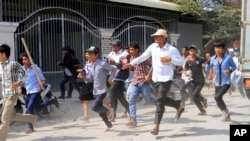Labor leaders say they want more changes to an impending law to regulate unions that they say will make it hard to protect the rights of workers.
Lawmakers had agreed to adjust some articles of the new law, which is currently being discussed in committee at the National Assembly, but union leaders say the provisions they propose adjusting are not enough.
The new law, as drafted, will make it harder for unions to form inside factories and sets out criminal punishment for union organizers in the case of violent demonstrations. Cambodia has around 1,000 active unions, most representing some 700,000 workers in the garment and textile manufacturing sector.
Ath Thon, head of the Cambodian Labor Confederation, told VOA Khmer that lawmakers have not “deeply discussed” the provisions of most concern to union leaders. “We are waiting to see the last development to know what it will be,” he said. “We will take part in providing ideas for adjustments to make this law good.”
Yang Sophoan, president of the Cambodian Alliance of Trade Unions, urged lawmakers to remove provisions that make it difficult to protect workers’ rights. Some provisions need to be cut completely, otherwise the law “doesn’t protect the interests of workers or unions,” she said.
Provisions that should be stripped include those that require financial reporting from unions to the Ministry of Labor, and requirements for a minimum number of workers in any factory to give their support to the formation of a union, she said.
Lawmakers from the ruling Cambodian People’s Party and the opposition Cambodia National Rescue Party are at odds over some parts of the law, including provisions related to workers’ decisions to strike or demonstrate. Some Rescue Party lawmakers say they want the law to be more inclusive of other workers, too, such as restaurant employees and domestic servants.
Rescue Party lawmaker Son Chhay said he was against a provision that required unions to gather all their members to discuss a strike. “Some unions have thousands of members, or hundreds of thousands,” he said. “How can a union call its members to make decision?” The more sensitive points in the draft will be discussed Jan. 13, he said.
CPP lawmaker and spokesman Sok Eysan, meanwhile, said the law will be put forward for discussion and “broad consultation,” after it is discussed by an Assembly working group.
Officials at the Ministry of Labor could not be reached for comment Wednesday.







